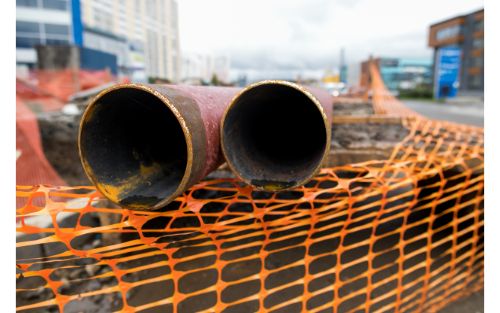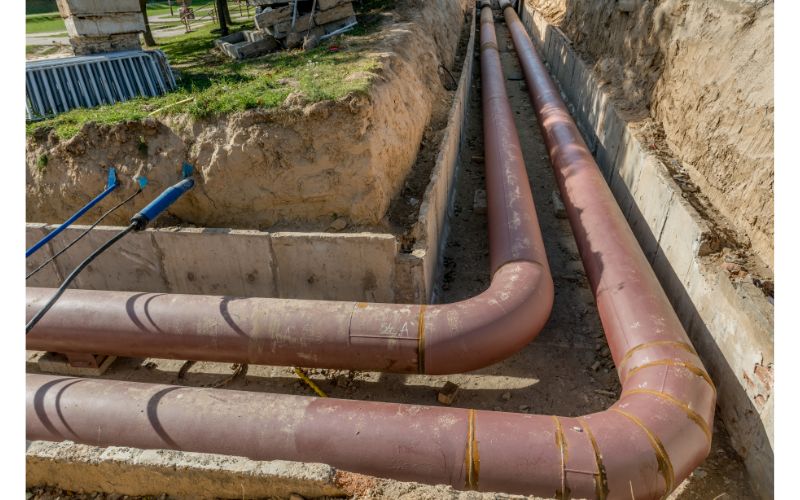The longevity of the sewer line of every property always matters to the owner. And people always hate dealing with higher costs associated with the replacement of sewer pipes. So, they install cast iron pipes to ensure a longer life span of the system.
But how long does a cast iron sewer pipe last? If the installed cast iron pipes are thick, they will last 80-100 years. If the pipes are thin, you expect a lifespan of 50-70 years.
Here, we cover all the aspects regarding the cast iron sewer pipeline’s lifespan. Let’s check the details.
How Long Does Cast Iron Sewer Pipe Last?
We have already mentioned that this type of sewer line lasts 50-100 years. We know that this does not provide an in-depth view. Here, we perform a detailed exploration.
Several prominent factors negatively influence the lifespan of cast iron sewer pipelines. Let’s check them out one by one.
1. Pipe’s Thickness
 The thickness of a cast iron pipe plays a significant role in its durability. Though cast iron is known for its strength and resilience, thinner pipe walls have a reduced lifespan than pipes with thicker walls. Below are the considerable points regarding this factor:
The thickness of a cast iron pipe plays a significant role in its durability. Though cast iron is known for its strength and resilience, thinner pipe walls have a reduced lifespan than pipes with thicker walls. Below are the considerable points regarding this factor:
| Thinner cast iron sewer pipe | Thicker cast iron sewer pipe |
| Compromised overall structural integrity | Greater strength and resistance |
| Degraded resistance to corrosion | Higher resistance to corrosion |
| Susceptible to damage during handling, transportation, etc. | Withstand the mechanical stresses and impacts effectively |
| Less able to handle heavy loads | Better load-bearing capacity |
2. Corrosion
By having decades-long experience in sewer system installation, repair, and replacement, we see corrosion is the number one killer of the cast iron-made sewage system. Even though cast iron is tough, its molecular structuring is prone to corrosion.
You must know that the pipes could host rust if your property’s cast iron pipeline is exposed to moisture, toxic water, oxygen, and corrosive substances. And they formed rust weakening the structural integrity of the pipes over time.
We must mention that factors such as inappropriate pH levels, dissolved oxygen content, and aggressive chemicals in the wastewater also contribute to the corrosion process.
Watch this YouTube video to deal with cast iron sewer pipe corrosion:
3. Environmental Factors
Soil conditions, temperature, moisture, etc., and environmental factors play a crucial role in determining the lifespan of cast iron sewer pipes. Soils with high acidity or alkalinity boost the corrosion.
On the other hand, soils with low moisture levels cause the pipes to dry out and become more susceptible to cracking. So, if you live in an area with 4-6 months of freezing temperatures, you can expect the pipeline to get damaged soon.
Like every other metal, cast iron pipes also receive expansion and contraction following temperature variations. And the continuous orientation of expansion and contraction initiates the structural damage of the pipes.
4. Natural Events
Well, it is true that some natural events also can damage your sewer system’s cast iron pipes. Here is a comprehensive discussion about such events.
- The associated ground movement due to earthquakes can initiate cracks in the pipes. Over time, these cracks fully damage the pipe.
- If there is a flood in your area, the toxic water negatively impacts the pipe’s outer wall. The associated chemical reactions deteriorate the lifespan of the cast iron pipe.
- Seeds can be dispatched naturally nearby the pipeline, and trees can grow just beside the pipeline. With the passage of time, the respective roots damage the pipe by weakening its wall or triggering corrosion.
5. Impacts of Chemicals
Certain chemicals and substances in wastewater reduce the lifespan of cast iron sewer pipes. For instance, the decomposition of organic things inside the pipe produces hydrogen sulfide gas. This gas causes significant corrosion.
Again, aggressive chemicals, such as chlorides, sulfates, and industrial waste products, also contribute to deterioration. Additionally, the presence of sand or grit within the wastewater also causes wear and erosion of the pipe’s inner surfaces.
This erosion slowly deteriorates the lifespan of the cast iron sewage system.
Other Factors
- Hair cracks can be formed before installation, during transportation, placing, or fixing if the pipe falls or receives excessive pressure. These hair cracks, later on, contribute to the degraded life span of the pipes.
- Sewer lines are underground. If construction work occurs nearby, the worker can unintentionally damage the cast iron pipes underneath soils while drilling, excavating, etc.
- No maintenance of the cast iron pipeline for more than 4-5 years also reduces its lifespan significantly.
Tips to Protect Cast Iron Sewer Pipelines
Protecting cast iron sewer pipelines is essential to ensure their longevity. Here are some tips for you.
- Build a concrete casing first, then install the pipes inside the casing. The casing will provide extensive protection against outside pressure, environmental factors, etc.
- Once a year, just after winter, check the whole piping system. And take addressing approaches if any issue is found.
- Regularly cleaning cast iron sewer pipes is crucial to removing debris, sediment, and other buildups contributing to corrosion or blockages.
- Extract the toxic substances before releasing the wastewater into the cast iron pipe. For industrial wastewater, it is recommended to treat the wastewater before releasing it.
- Do not use harsh chemical drain cleaners, as they can corrode the cast iron pipes.
- Provide an extra layer of protection inside and outside of the pipe to restrict corrosion and deterioration of thickness.
Most Common Questions
Here are some general questions regarding the longevity of a cast iron-make sewage line.
Q1: What are the alternatives to cast iron sewer pipes?
There are several other types of pipes that you can use instead of cast iron pipes. Some must-mentions are PVC pipe, ductile iron pipe, concrete pipes, etc. However, these last less in comparison to cast iron sewage pipes.
Q2: Does insurance cover sewer with cast iron pipes?
No. If you install cast iron pipes for your property’s sewer system, it is sure that, over time, these will get corroded. Following this, insurance does not cover the cost associated with cast iron pipe damage.
Q3: How much does replacing the sewer system’s cast iron pipes cost?
It depends on the workload and toughness of the work. In general, it can cost you $140-$190 per foot.
Final Words
Cast iron sewer pipes have a proven track record of durability and longevity; these usually last for 50-100 years. But if you ask how long does cast iron sewer pipe last, the honest answer will be it varies. These sewer pipes last long if you follow standard installation and maintenance.
Also, you must restrict the negative impacts of chemicals, the environment, etc. Finally, we never suggest you repair or replace the cast iron sewer line by yourself if you do not have the required skill and tools. Take professional help; it will save you a lot in the long term.

